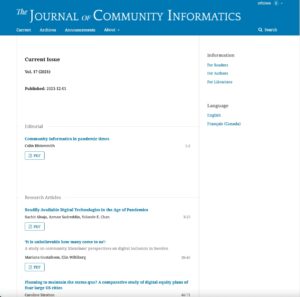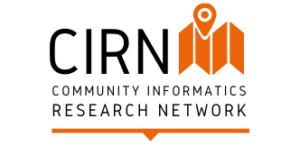 In our 2017 article, titled “Creating Caring Institutions for Community Informatics,” Dr. Miriam Sweeney (University of Alabama) and I explored the potential affordances of applying a feminist ethics of care approach to public libraries and community technology centers–the places where people go when they are unable to pay for the Internet at home.
In our 2017 article, titled “Creating Caring Institutions for Community Informatics,” Dr. Miriam Sweeney (University of Alabama) and I explored the potential affordances of applying a feminist ethics of care approach to public libraries and community technology centers–the places where people go when they are unable to pay for the Internet at home.
In our paper, we argued the following:
“An ethics of care framework has several possible affordances for infomediary practices in these institutions, including highlighting the gendered power dynamics that define and shape existing practices; distributing care work and making existing care work visible; and envisioning a more holistic and ethical approach to engaging diverse publics.”
We translated Tronto’s (2010) seven warning signs for “bad care” in public institutions into seven positive guidelines for providing “good care” in public libraries, community technology centers, and other community-care spaces. We then contextualized these guidelines for the institutions that people rely on, and increasingly during the pandemic, particularly for those who cannot afford the high cost of broadband.
These seven positive guidelines include the following main points:
- All humans need and deserve care
- Needs are contextually and culturally defined
- Care is a process, not a service or commodity
- Expertise is situated and distributed
- Caring is a relational process wherein people may assume many, and simultaneous, roles
- Caring is a routine part of every aspect of professional practice
- Care work is a shared responsibility; the equal distribution of care work is a political act
As the Biden Administration, members of Congress, and the Federal Communication Commission continue to push important legislation and federal programs forward to address the digital divide, I believe there is an urgent need to develop new ways of thinking about digital equity that embrace some of the ideas presented above.
This work urgently joins more recent and growing calls within the fields of social work, public librarianship, and related areas that intersect with these fields that demand we consider the ways in which economic inequality and racial injustice continue to keep digital equity out of reach for millions of Americans. This is because, as we argued in our 2017 paper, “interventions that are narrowly focused on providing individual access to technology are inadequate for addressing the structural forces that continue to shape the allocation of resources along the axes of race, class, and gender,” and other social identities.
In other words, our feminist ethics of care in digital equity work must be intersectional.
Last year, Susan Kennedy and I argued the following in our article for the Benton Institute for Broadband & Society:
“To inform this work, the next administration should develop a digital equity and racial justice task force that brings together social workers, public librarians, community organizers, and other community-care practitioners to develop strategies and tools to promote digital and racial equity in communities most impacted by the pandemic.”
Federal policymakers will not be able to address the digital divide without addressing its root causes, including economic inequality, racial injustice, and other systemic social issues.
The time is now to bring together care workers with digital equity practitioners, researchers, and policymakers to ensure that federal policies and programs connect to those who need broadband the most.
(Photo above by Brenda López Espinosa available under a Creative Commons license)


